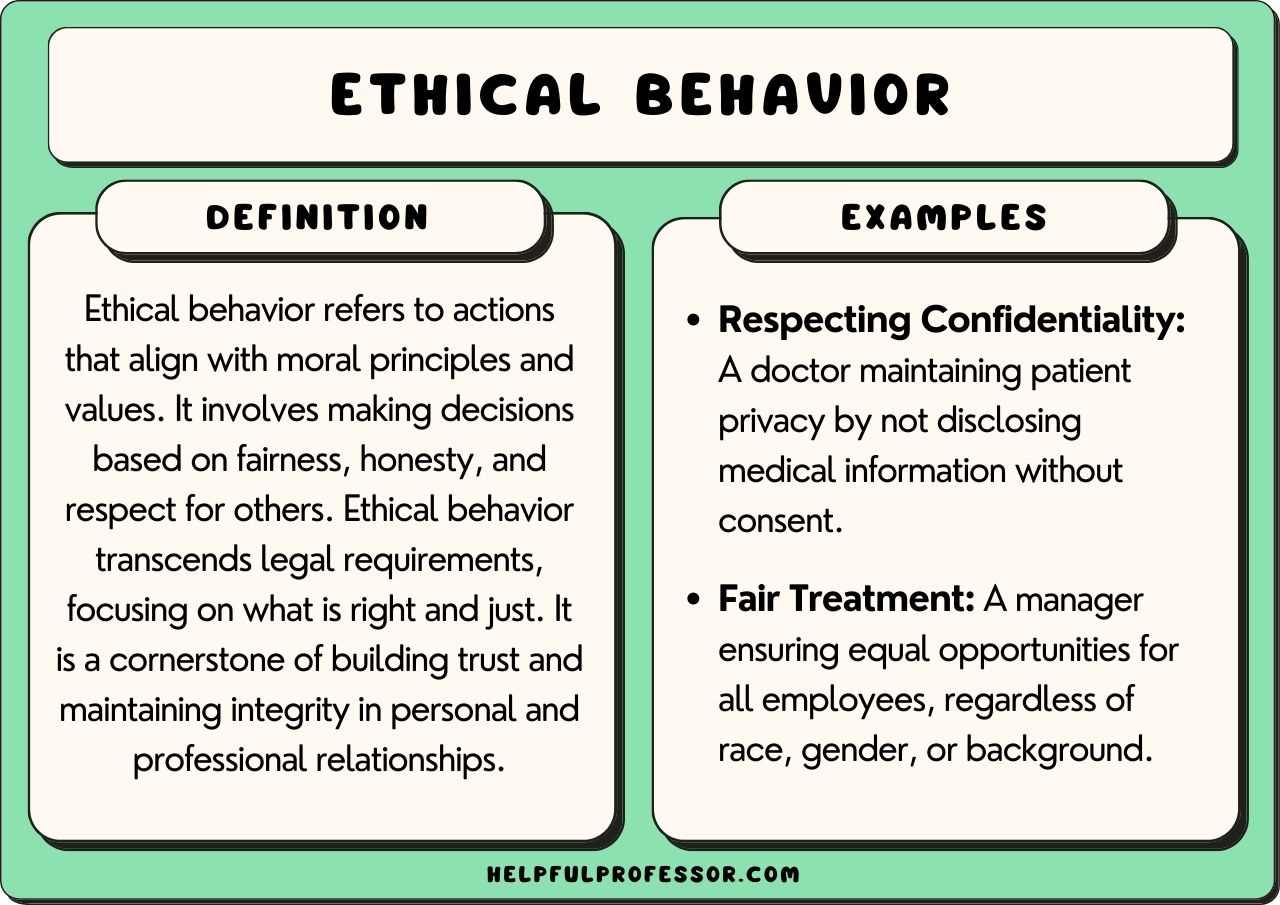Importance of Code of Ethics in Business
A code of ethics is a set of principles and values that guide the behavior and decision-making of individuals and organizations. In the business world, a code of ethics is essential for creating a positive and ethical work environment.
One of the main reasons why a code of ethics is important in business is that it helps establish a strong ethical culture within the organization. When employees are aware of the ethical standards and expectations set by the company, they are more likely to make ethical decisions and act in an ethical manner.
Having a code of ethics also helps build trust and credibility with stakeholders, including customers, employees, and investors. When a company demonstrates a commitment to ethical behavior, it enhances its reputation and attracts customers who value ethical practices. Employees are also more likely to feel proud to work for a company that prioritizes ethics.
Furthermore, a code of ethics provides guidance for employees when faced with ethical dilemmas. It helps them navigate complex situations and make decisions that align with the company’s values. This can prevent unethical behavior and minimize the risk of legal and reputational damage.
Lastly, a code of ethics can serve as a tool for continuous improvement. It allows organizations to regularly review and update their ethical standards to adapt to changing societal expectations and industry norms. This ensures that the company remains relevant and ethical in a rapidly evolving business landscape.
Different Types of Code of Ethics
A code of ethics is a set of principles and guidelines that govern the behavior and decision-making of individuals within an organization. It serves as a moral compass, providing a framework for ethical conduct and ensuring that all members of the organization adhere to the same standards. There are several different types of code of ethics that can be implemented in a business setting:
1. General Code of Ethics
A general code of ethics is a broad set of principles that apply to all employees within an organization. It outlines the fundamental values and expectations for ethical behavior, such as honesty, integrity, and respect. This type of code of ethics provides a foundation for ethical decision-making and serves as a guide for employees in all aspects of their work.
2. Professional Code of Ethics
A professional code of ethics is specific to a particular profession or industry. It outlines the ethical responsibilities and standards of conduct that professionals in that field should adhere to. This type of code of ethics helps to maintain the integrity and reputation of the profession, and ensures that professionals act in the best interests of their clients or customers.
3. Corporate Code of Ethics
A corporate code of ethics is specific to a particular organization. It reflects the values, mission, and culture of the company, and provides guidelines for ethical behavior that are tailored to the organization’s unique circumstances. This type of code of ethics helps to create a positive work environment, build trust with stakeholders, and promote ethical decision-making throughout the organization.
4. Industry Code of Ethics
An industry code of ethics is developed by a trade association or professional organization that represents a specific industry. It sets out the ethical standards and best practices that members of the industry should follow. This type of code of ethics helps to maintain the reputation and credibility of the industry, and ensures that all members operate in a fair and ethical manner.
5. International Code of Ethics
An international code of ethics is a set of principles and guidelines that apply to organizations operating in multiple countries. It takes into account cultural differences and legal requirements in different countries, and provides a framework for ethical behavior that is applicable across borders. This type of code of ethics helps to ensure consistency and fairness in the global marketplace.
Overall, implementing a code of ethics in a business is essential for promoting ethical behavior, maintaining trust with stakeholders, and creating a positive organizational culture. The specific type of code of ethics that is implemented will depend on the nature of the organization and its industry, but all types serve the common purpose of guiding ethical decision-making and behavior.
Implementing a Code of Ethics in Your Organization

Implementing a code of ethics is crucial for any organization as it sets the standards and expectations for ethical behavior among employees. It serves as a guide for decision-making and helps create a positive work culture. Here are some steps to effectively implement a code of ethics in your organization:
1. Define the Values and Principles

Start by clearly defining the values and principles that your organization wants to promote. This can be done through brainstorming sessions or by involving key stakeholders. Identify the core values that align with your organization’s mission and vision.
2. Develop the Code of Ethics
Once the values and principles are defined, develop a comprehensive code of ethics document. This document should outline the expected behavior, responsibilities, and guidelines for employees. It should cover various aspects such as honesty, integrity, respect, confidentiality, and compliance with laws and regulations.
3. Communicate and Train
It is essential to effectively communicate the code of ethics to all employees. This can be done through training sessions, workshops, or orientation programs. Make sure that employees understand the importance of the code of ethics and how it applies to their daily work. Encourage open discussions and address any questions or concerns.
4. Lead by Example
Leaders and managers play a crucial role in implementing a code of ethics. They should lead by example and demonstrate ethical behavior in their actions and decisions. This sets the tone for the entire organization and encourages employees to follow suit.
5. Establish Reporting Mechanisms
Implement a system for employees to report any ethical concerns or violations. This can be done through anonymous reporting channels, such as a hotline or an online platform. Ensure that employees feel safe and protected when reporting any issues and that appropriate actions are taken to address them.
6. Regularly Review and Update
A code of ethics should not be a static document. It should be regularly reviewed and updated to reflect changes in laws, regulations, and industry standards. Solicit feedback from employees and stakeholders to ensure that the code of ethics remains relevant and effective.
By implementing a code of ethics, organizations can foster a culture of integrity, trust, and accountability. It helps create a positive work environment and enhances the reputation of the organization. It also serves as a valuable tool for attracting and retaining ethical employees.
Benefits of Having a Code of Ethics
A code of ethics is a set of principles or guidelines that outline the moral and ethical values and standards that an organization or individual should adhere to. Implementing a code of ethics in your organization can have numerous benefits:
1. Establishing a Strong Organizational Culture
2. Building Trust and Credibility
A code of ethics demonstrates to stakeholders, including customers, employees, and investors, that the organization is committed to ethical practices. It builds trust and credibility by showing that the organization operates with integrity and holds itself accountable to high ethical standards. This can enhance the organization’s reputation and attract more customers and investors.
3. Guiding Decision-Making
A code of ethics serves as a guide for decision-making in the organization. It provides a framework for employees to make ethical choices when faced with dilemmas or difficult situations. By having a code of ethics in place, employees have a reference point to help them navigate ethical challenges and make decisions that align with the organization’s values.
4. Mitigating Legal and Reputational Risks
A code of ethics helps to mitigate legal and reputational risks for the organization. By clearly outlining ethical standards and expectations, it reduces the likelihood of unethical behavior, such as fraud, corruption, or discrimination. This can help the organization avoid legal consequences and protect its reputation.
5. Enhancing Employee Engagement and Retention
A code of ethics can enhance employee engagement and retention. When employees feel that their organization operates with integrity and values ethical behavior, they are more likely to feel engaged and committed to their work. This can lead to higher job satisfaction, increased productivity, and lower turnover rates.
6. Promoting Ethical Leadership
A code of ethics promotes ethical leadership within the organization. It sets the tone from the top and encourages leaders to lead by example. When leaders demonstrate ethical behavior and hold themselves accountable to the code of ethics, it creates a culture of integrity and inspires others to do the same.
Examples of Successful Code of Ethics in Business
A code of ethics is a set of principles and guidelines that govern the behavior and decision-making of individuals within an organization. It serves as a moral compass, ensuring that businesses operate ethically and responsibly. Many successful companies have implemented strong codes of ethics, which have helped them maintain a positive reputation and build trust with their stakeholders.
Here are some examples of successful code of ethics in business:
- Patagonia: Patagonia, an outdoor clothing company, has a code of conduct that reflects its commitment to environmental sustainability and social responsibility. The company promotes fair labor practices, supports environmental conservation, and encourages transparency and honesty in its operations.
- Microsoft: Microsoft’s code of conduct focuses on trust, respect, and integrity. It emphasizes the importance of treating customers, partners, and employees with fairness and respect. The company also has strict guidelines regarding bribery, corruption, and conflicts of interest.
- Starbucks: Starbucks has a comprehensive code of ethics that covers a wide range of topics, including ethical sourcing, diversity and inclusion, and community involvement. The company is committed to providing a safe and inclusive environment for its employees and customers, while also promoting sustainability and social responsibility.
- Johnson & Johnson: Johnson & Johnson’s code of business conduct emphasizes the company’s commitment to ethical behavior, integrity, and compliance with laws and regulations. The code covers a wide range of topics, including product safety, data privacy, and fair competition.
These examples demonstrate that a strong code of ethics can help businesses navigate ethical dilemmas, build trust with stakeholders, and create a positive corporate culture. By adhering to ethical principles and values, companies can not only protect their reputation but also contribute to the greater good of society.

Emily Bibb simplifies finance through bestselling books and articles, bridging complex concepts for everyday understanding. Engaging audiences via social media, she shares insights for financial success. Active in seminars and philanthropy, Bibb aims to create a more financially informed society, driven by her passion for empowering others.
